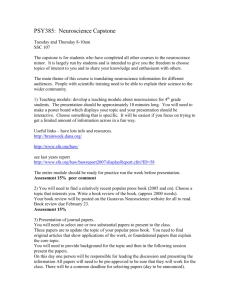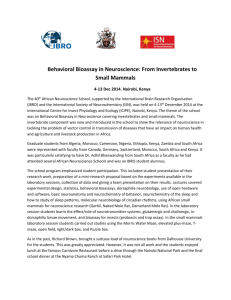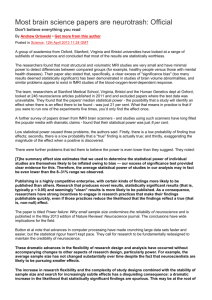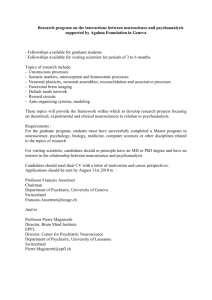CERTIFICATE IN NEUROSCIENCE NURSING
advertisement
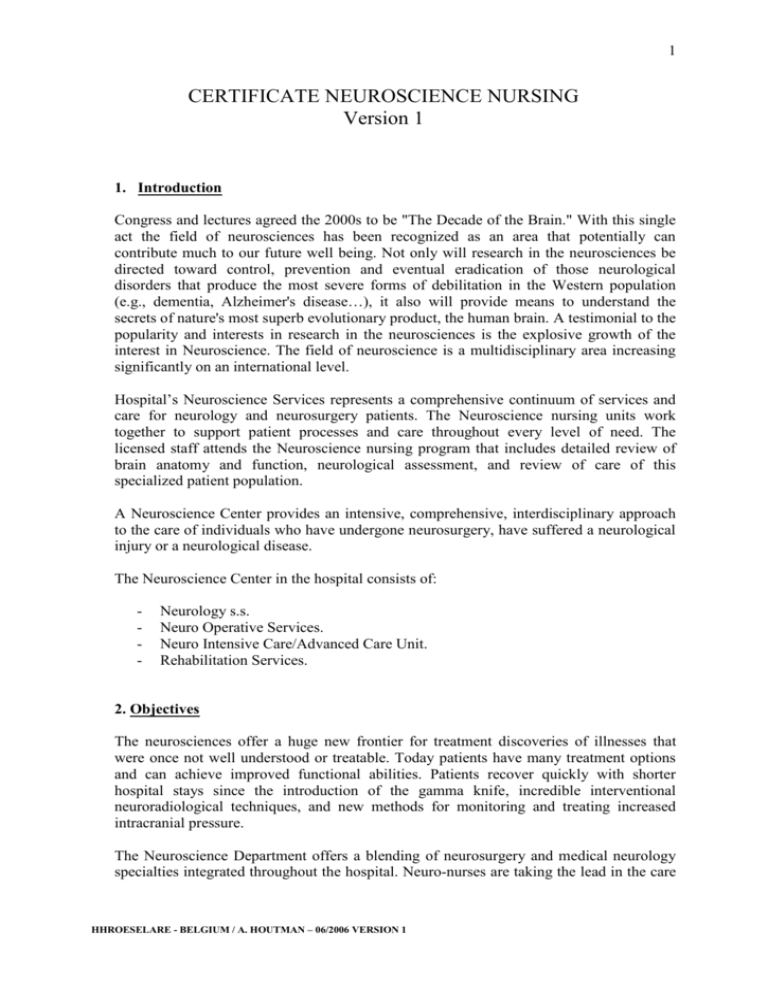
1 CERTIFICATE NEUROSCIENCE NURSING Version 1 1. Introduction Congress and lectures agreed the 2000s to be "The Decade of the Brain." With this single act the field of neurosciences has been recognized as an area that potentially can contribute much to our future well being. Not only will research in the neurosciences be directed toward control, prevention and eventual eradication of those neurological disorders that produce the most severe forms of debilitation in the Western population (e.g., dementia, Alzheimer's disease…), it also will provide means to understand the secrets of nature's most superb evolutionary product, the human brain. A testimonial to the popularity and interests in research in the neurosciences is the explosive growth of the interest in Neuroscience. The field of neuroscience is a multidisciplinary area increasing significantly on an international level. Hospital’s Neuroscience Services represents a comprehensive continuum of services and care for neurology and neurosurgery patients. The Neuroscience nursing units work together to support patient processes and care throughout every level of need. The licensed staff attends the Neuroscience nursing program that includes detailed review of brain anatomy and function, neurological assessment, and review of care of this specialized patient population. A Neuroscience Center provides an intensive, comprehensive, interdisciplinary approach to the care of individuals who have undergone neurosurgery, have suffered a neurological injury or a neurological disease. The Neuroscience Center in the hospital consists of: - Neurology s.s. Neuro Operative Services. Neuro Intensive Care/Advanced Care Unit. Rehabilitation Services. 2. Objectives The neurosciences offer a huge new frontier for treatment discoveries of illnesses that were once not well understood or treatable. Today patients have many treatment options and can achieve improved functional abilities. Patients recover quickly with shorter hospital stays since the introduction of the gamma knife, incredible interventional neuroradiological techniques, and new methods for monitoring and treating increased intracranial pressure. The Neuroscience Department offers a blending of neurosurgery and medical neurology specialties integrated throughout the hospital. Neuro-nurses are taking the lead in the care HHROESELARE - BELGIUM / A. HOUTMAN – 06/2006 VERSION 1 2 of patients who have come to the hospital for therapies and innovative technologies to treat diseases of the nervous system. Even within the Neuroscience specialty, nurses become well versed in many disease processes that affect the nervous system: seizure disorders, cerebro-vascular and spine disorders, tumours, developmental, degenerative and infectious diseases are just a few examples of these processes. 3. Competence Nurses who join the Neuroscience Department will develop into specialty nurses who are also competent in medical and surgical nursing practice. Whether the path takes the nurse into Neuro-critical care or the acute care settings, he/she has an opportunity to work in special units that focus on special patient populations. In the Epilepsy Monitoring Unit i.e., nurses care for patients across the lifespan, monitoring infants, children and adults with life-altering seizure problems. The acute Stroke Unit and the hydrocephalus service will fine-tune the skills in neurological problems common to many acute care settings. The nurse will team up with fellow nurses in developing the competence and even aiming for specialty certification The Neuroscience Nurse Program is intended to orient registered nurses with present clinical experience to the specialized profession of neuroscience nursing. The topical areas for a variety of nervous system disorders that will be approached include: - Neuroanatomy, Neuropathophysiology, Epidemiology, Diagnostic evaluation, Medical and nursing management, Investigational therapies Patient education. The clinical experience element of the program is supervised by preceptors. Participants have contact with patients in the neuroscience outpatient and inpatient units and attend interdisciplinary neuroscience rounds and conferences. Participants also have the opportunity to gain further experience through extramural observation at local rehabilitation and neurotrauma health care facilities. The program consists of classroom lectures, group seminars and hands - on clinical experience. Neuroscience nurses pride themselves on compassionate and patient focused care. Nurses practice with autonomy and are responsible for the care of patients with diagnoses such as brain tumors, aneurysms, degenerative spine disease, epilepsy, cerebrovascular disease… Neuroscience Critical Care Unit (NCCU) nurses specialize in the management of patients with brain and spinal cord related diagnoses such as brain tumours, CVA, Guillian-Barre syndrome, myasthenia gravis, brain or spinal trauma and seizure, intra-cerebral haemorrhages…. These nurses practice also a range of interventions such as management of cerebral oedema, increased intracranial pressure and cerebral resuscitation. HHROESELARE - BELGIUM / A. HOUTMAN – 06/2006 VERSION 1 3 4. Study Program The primary goal of the Neuroscience Program is to develop and train neuroscientists with expertise in all aspects of modern neurobiology. The Neuroscience Program is designed to be a modular program that meets the students' needs for basic and advanced instruction in most areas of the neurosciences. The main purpose of the program is to provide instruction in several areas of neuroscience ranging from molecular and cellular neurosciences to behavioural biology including neural network models. In addition, there is an expanding emphasis on clinical neurosciences as a framework to provide a biomedical background and foster interests in prevention and treatment of neurological disease. Major research efforts are focused on the key areas of neurobiology of aging, development of the nervous system, neurobiology of memory and learning, programmed cell death, neuro-degeneratieve disease, neurobiology of alcohol and substance abuse, sensory neurobiology, regeneration and repair of the injured nervous system, cognitive neurobiology, and molecular neurobiology All neuroscience students participate in a unified core curriculum composed of the following courses: - Introduction to Neuroscience, Behavioural Neuroscience, Neuropharmacology, Clinical Neuroscience, and Molecular Neuroscience. Neuroanatomy, Cellular/Molecular Neuroscience, Developmental Neuroscience, Sensory-Motor Systems Behavioural-Cognitive Neuroscience. Experimental Design and Statistics. Each student is expected to prepare and orally defend a comprehensive written research proposal The Neuroscience Program also is a research oriented training program for students to become skilled investigators in the complex and rapidly changing field of neurobiology. To foster this goal, students are encouraged to begin to participate in independent research projects during their study. Graduate students in neuroscience actively participate in journal clubs, graduate tutorials, and regular seminars presented by outside speakers who are sponsored by basic science and clinical departments. HHROESELARE - BELGIUM / A. HOUTMAN – 06/2006 VERSION 1 4 5. Course Descriptions BACHELOR LEVEL A. Introduction to Neuroscience This course covers basic topics in the neurosciences with: Neuroanatomy (also laboratory work in Neuroanatomy), Cellular and molecular neuroscience, developmental neuroscience, sensory systems and motor systems. B. Introduction to Clinical Neuroscience A discussion of topics dealing with the pathophysiology of patients with neurological problems. This is an introduction to major concepts of patient care with utilization of upto-date methodology in clinical neuroscience C. Neuropharmacology The course will discuss general principles of drug action, including receptor binding, second messengers, and neurotransmitter metabolism. It also will survey neurotransmitter function, including acetylcholine, biogenic amines, excitatory and other amino acids, and neuropeptides. (General survey of neuropharmacology, emphasizing neurotransmitters, receptors and their interactions.) D. Seminars in Neuroscience A series of research presentations by guest lecturers from that will discuss modern concepts, methods, and approaches used in understanding nervous system structure, function and pathology. Course in Belgium: Certification program Neuroanatomy and physiology of the Nervous System The Adult Neurologic Neuroassessment Neuro-obseservation and Neurodiagnostic Neurotrauma: Head and Spine Injury (and Spine Injury s.s.) Cranial Surgery Central Nervous System Infections Metabolic Disorders Coma and Alterations in Consciousness Brain Tumors Neuroscience Critical Care and ICP Monitoring Rehabilitation of the Neuroscience Patient (also paediatrics: study and writing disabilities) Peripheral and Cranial Nerve Disorders Brain Attack/Stroke Management Management of Movement & Degenerative Disorders Neuromuscular and Auto-immune Disorders Pain and Headache Management of Seizures and Epilepsy Dementia and Alzheimer disease (Eight-day program = eight hours, congress included ) HHROESELARE - BELGIUM / A. HOUTMAN – 06/2006 VERSION 1 5 MASTER LEVEL A. Behavioural Neurosciences Behavioural neuroscience is a relatively new and rapidly expanding discipline utilizing techniques of molecular biology, neurochemistry, neurophysiology and psychology to investigate the neurobiological aspects of behaviour. The course will provide a survey of the field from the cellular level to the complexity of molar aspects of behaviour including learning and memory. An introduction to laboratory models of human neurobiologic disorders will also be included. B. Molecular Neuroscience This course will introduce the students to the basic principles of neurobiology as studies by cell and molecular biologists. Lectures will introduce invertebrate and vertebrate model neuronal systems and the cellular and molecular methods to study them. C. Seminars in Neuroscience A series of research presentations by guest lecturers from that will discuss modern concepts, methods, and approaches used in understanding nervous system structure, function and pathology. HHROESELARE - BELGIUM / A. HOUTMAN – 06/2006 VERSION 1 6 SAMPLE OF ELECTIVE COURSES NEUROSCIENCE PROGRAM MASTER LEVEL I. II. III. IV. V. VI. VII. VIII. IX. X. Biochemistry Intracellular Signaling Immunochemistry Biology Neurobiology Development Molecular Biology Sensory Biology Behavioural Ecology Cell Physiology Comparative Medicine Animal Models in Biomedical Research Microbiology and Immunology Fundamentals of Immunology Molecular and Cellular Pathobiology Research Techniques in Electron Microscopy Fundamentals of Pathophysiology Molecular Genetics Molecular Biology Human Molecular Genetics Molecular Medicine Introduction to Molecular Medicine Neurobiology and Anatomy Cell Biology Development and Anatomy of Sensory Systems Sensory Neuroscience I: audition and Vision Sensory Neuroscience II: Somatosensation, Taste and Olfaction Sensory Neuroscience III: Higher Order Interactions and Integration Developmental Neurobiology I: Molecular control of Neural Lineages and Differentiation Developmental Neurobiology II: Progressive and Regressive Events in Neural Development Developmental Neurobiology III: Neural Plasticity and Regeneration Career Development in Neurobiology Physiology and Pharmacology Perinatal Physiology I Perinatal Physiology II Neuroendocrinology Nerve Cell Physiology and Plasticity Behavioral Pharmacology Neurobehavioral Pharmacology Neurotoxicology Biology of Alcohol Abuse - alcoholism Psychology Developmental Psychobiology Psychopharmacology Biological Psychology Neuropsychology and Learning Disabilities Neuroscience and Animal Behavior HHROESELARE - BELGIUM / A. HOUTMAN – 06/2006 VERSION 1 7 HHROESELARE - BELGIUM / A. HOUTMAN – 06/2006 VERSION 1


